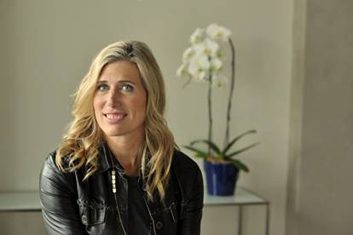Silken Laumann’s tips for raising healthy kids
Silken Laumann is probably best know for her remarkable comeback from a brutal leg injury to win a bronze medal

Silken Laumann is probably best know for her remarkable comeback from a brutal leg injury to win a bronze medal for Canada in single sculls rowing at the 1992 Olympic Games in Barcelona. The three-time Olympic medallist retired in 1999. Today, she is focused on her work as a children’s advocate for the GoodLife Kids Foundation and as a member of the International Board of Directors for Right to Play.
In her recent memoir, Unsinkable, Laumann revealed her struggles with disordered eating throughout her teen years and during her athletic career. It was after she became a mom that she realized the importance of being a role model for her kids and since then has adopted a healthier approach to nutrition. Now, Laumann has partnered with Multi-Grain Cheerios in ‘World Without Dieting,’ a movement to end dieting for the next generation.
Here, she shares her tips for encouraging healthy habits in kids.
Model healthy behaviours
‘As a mom, I’m very conscious of my own relationship with food and with my body because I think that children and teenagers pay more attention to what you do than what you say. That includes all the little things’how you look at yourself in the mirror, whether or not you suck in your stomach or pull at your clothes. I’m aware of those messages. I don’t have a scale in the house. And I don’t talk about eating in terms of ‘dieting,’ I talk about it in terms of nutrition.’
Make time for family meals
‘I cook with the kids a lot. Family meals are really important. In our culture, we’ve built up the idea that cooking is really hard. I didn’t learn to cook from my mom; My mom left when I was a teenager and I had to learn to cook as an adult. Some of the healthiest foods are the simplest to prepare. Following a recipe is not brain science; It doesn’t have to be perfect. Cooking salmon and rice and steaming some vegetables takes 20 minutes.’
Be active as a family
‘I have a ping pong table that gets wheeled into my kitchen regularly when the teenagers are home with their friends on weekends. We engage with each other over that table. Physical activity shouldn’t be seen in terms of exercise but in terms of play. I always encourage my kids to go play outside, and I join in with them. My kids see me enjoying physical activity. I exercise for joy, and for energy. Yoga makes me happy: It contributes to my connection to my soul. And I also love being on my bike. I’ll go out for several hours on a Saturday morning.’
Be realistic
‘As parents, we can sometimes get too obsessive about food. Yes, I have brought some foods into my home that I wouldn’t have 10 years ago because moderation is really important. It’s just not realistic to ban all sugar or chocolate bars or other sweets. I follow the 80/20 rule. So 80 percent of what I eat is really healthy. And the other 20 percent of the time, I’ll indulge. I’ll have a piece of chocolate cake, or a cappuccino in the morning. I don’t have a mentality of scarcity. And I teach my kids the same thing.’
Eat breakfast
‘For years, I skipped breakfast. And it was part of that old psychology of trying to limit the amount I ate. And it doesn’t work. When my daughter was five year old, I said to her ‘You have to eat breakfast, it’s the most important meal of the day.’ And she looked at me and replied ‘But mom, you don’t eat breakfast.’ Whoa! So, I started eating breakfast. In the morning, we’ll have fruit, cereal, shakes and eggs. You have to prepare things in advance. It’s a challenge for parents because we’re so tired and overworked, but it’s worth it.’
Forget about ‘dieting’
I’m proud of being part of the WorldWithoutDieting.ca campaign. This is something I’m really passionate about. I think that dieting doesn’t work and it’s unhealthy, for everybody, but in particular for girls. I think that women need to step up and say ‘I don’t want this for my girls’. I don’t want them to go though what I went through. When I had an eating disorder in my teen years, a lot of my energy’my mental, physical, spiritual energy’went toward food and controlling what I ate. Now that energy is completely freed up. Not only do I have more energy because I’m eating, I have more emotional energy to devote to the people I love in my life. It’s kind of like dropping a sandbag: you’re free just to be healthy.’
‘Joana Lourenço, associate editor




